General
Deans’ Forum lays strategies for better performance
Published
3 years agoon
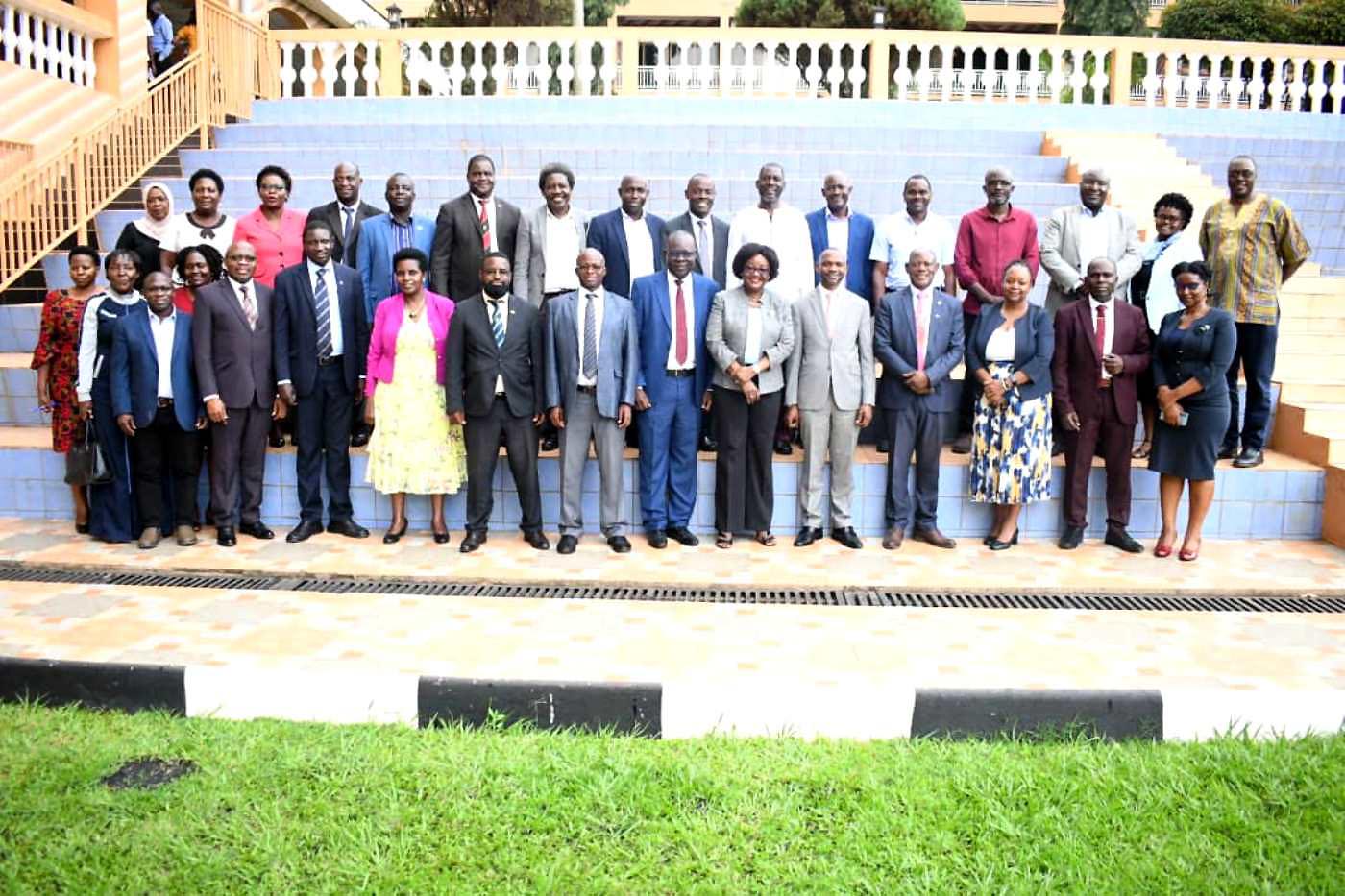
The Makerere University Deans’ Forum (MUDF) on Thursday 29th September, 2022 held a half-day workshop, the third since the inaugural one held on 26th February 2020. MUDF was formed following the Inaugural meeting of Deans and Directors in academic affairs held on 14th June 2019 under the theme “Building Institutional Capacity for Researcher Development, Funding and Management of Sponsored Research”.
Organised by the Office of the Deputy Vice Chancellor (Academic Affairs)-DVCAA the third workshop was aimed at highlighting the purpose of the Deans’ Forum and Constitution as well as the role of Academic Leaders in the implementation of the Makerere University Strategic Plan 2020-2030 presented by the Vice Chancellor, Prof. Barnabas Nawangwe. The workshop further tackled Monitoring and tracking performance of the Sustainable Development Goals (SDGs) at Makerere University and provided a platform for sharing of experiences by the DVCAA and MUDF Patron, Prof. Umar Kakumba and two former Deans.
Role of Academic Leaders in Mak’s Strategic Plan
“A research-led university is described generally as having at least 30% of its student body as graduate students. However, our recent graduation statistics showed that only 10% of our graduands were graduate students, of which 108 were PhDs, and so we have a lot of work to do,” remarked the Vice Chancellor as he began his presentation.
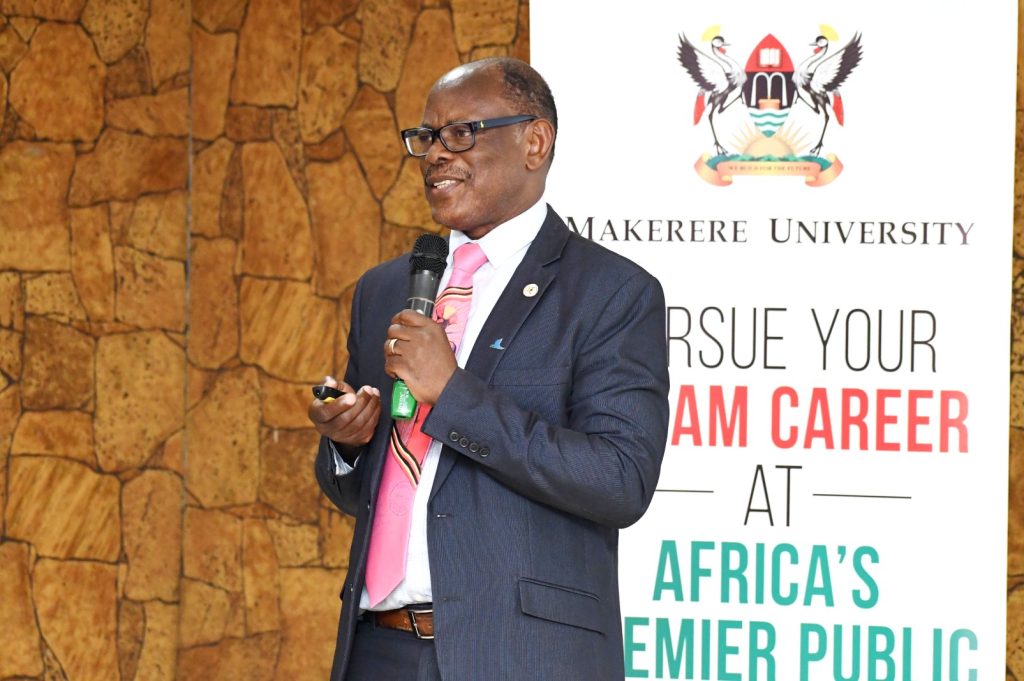
Prof. Nawangwe shared that in line with improving this trend, a component of PhD training had been incorporated in the fourth round of the Makerere University Research and Innovations Fund (Mak-RIF). He added that if each of the approximately 900 staff with PhDs supervised another three PhDs, the university could graduate at least 500 PhDs every year.
On the innovation front, the Vice Chancellor shared that Makerere signed a Memorandum of Understanding with United Nations Development Programme (UNDP) on 20th September 2022, aimed at establishing a state-of-the-art innovation hub to skill students in various sectors, with a view of empowering startups and creating jobs. “The ground floor of the Yusuf Lule Central Teaching Facility is going to be our hub area and we hope that when this phase succeeds, UNDP will work with us to establish an industrial park at the Campus.”
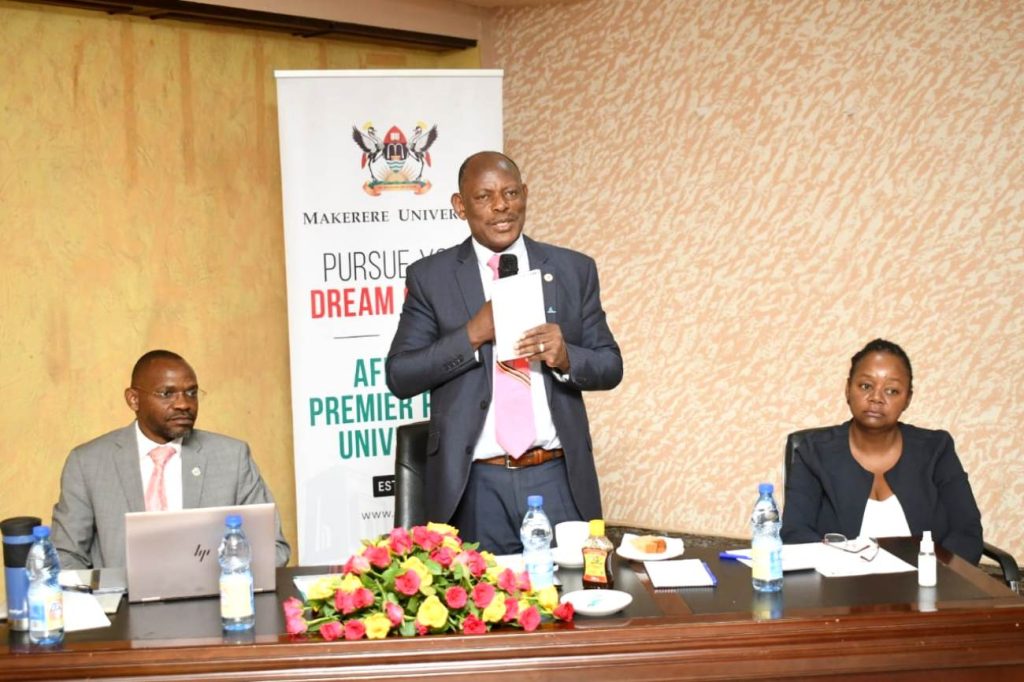
Prof. Nawangwe therefore urged Deans as Academic Leaders to be at the forefront of setting the research agenda and priorities in their units. “Under Mak-RIF, we discussed with Government what areas of research we ought to prioritise but things keep evolving and Deans should be at the centre of discussing these changes as well as knowledge transfer partnerships.”
The Vice Chancellor singled out the Refugee Law Project (RLP) and Public Interest Law Clinic (PILAC) under the School of Law as well as the Infectious Diseases Institute (IDI) at the College of Health Sciences (CHS) as some of the units that were contributing enormously to communities through knowledge transfer. He nevertheless emphasized that knowledge transfer partnerships ought to ramped up across all units and publicised more rigorously.

Making a presentation on Delivering on the Role of Dean in Makerere, Prof. Umar Kakumba outlined; the curriculum, teaching and learning, research and innovations, taking the university to the community and academic support assistance as the five major niches the School heads oversee.
He added that Deans are entrusted with power and resources by their colleagues and the institution for which they must give account. “Leadership relates to the manner in which the power and resources that are entrusted to us are used to influence group behaviour towards the realization of our goals as a research-led, inclusive 21st century university that can spark impact and transformation of our society.”
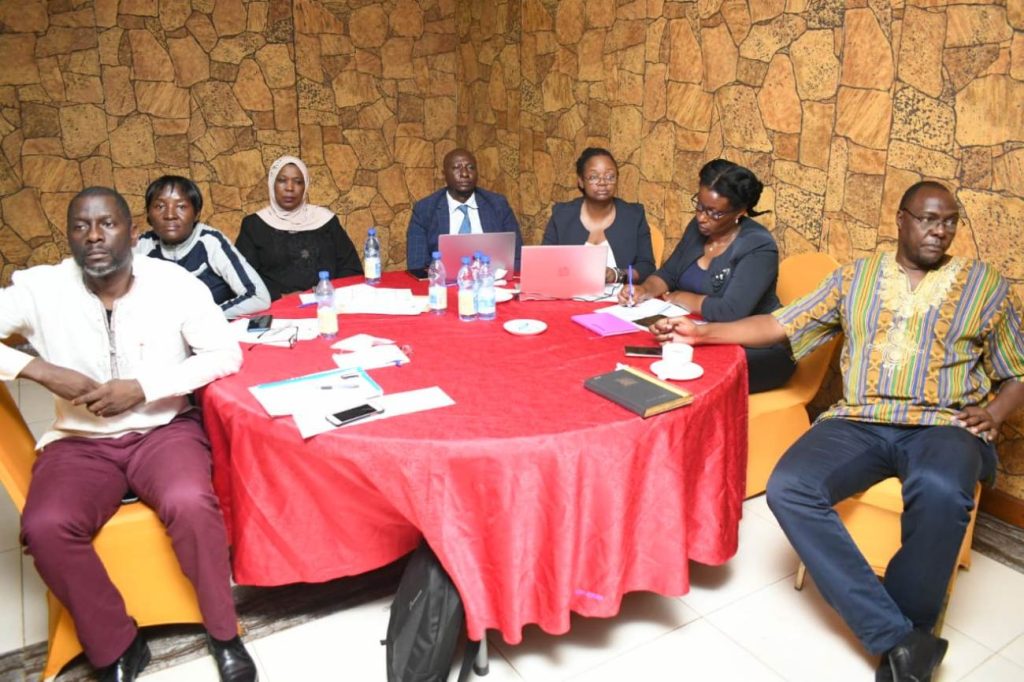
The DVCAA added that Deans by virtue of being members of Senate are a critical force in formulating academic policy that can guide, inform, support and foster the achievement of the institutional strategic plan.
Addressing himself to the changing context of Universities today, Prof. Kakumba emphasized that universities, beyond simply producing academic knowledge, must be seen to support the State in its development agenda and address emerging challenges of the global impact such as climate change, public health and food security. “We must increasingly show our organic linkage with the communities around us in terms of shared research.”
Former Deans Share Their Experiences
Prof. Ronald Bisaso served as Dean of the East African School of Higher Education Studies and Development (EASHESD) from 2015 to 2022 before assuming his current role as Deputy Principal, College of Education and External Studies (CEES). He said that his Deanship revolved around dealing with issues in the three niche areas of; higher education research, higher education policy and advocacy, and higher education practice.
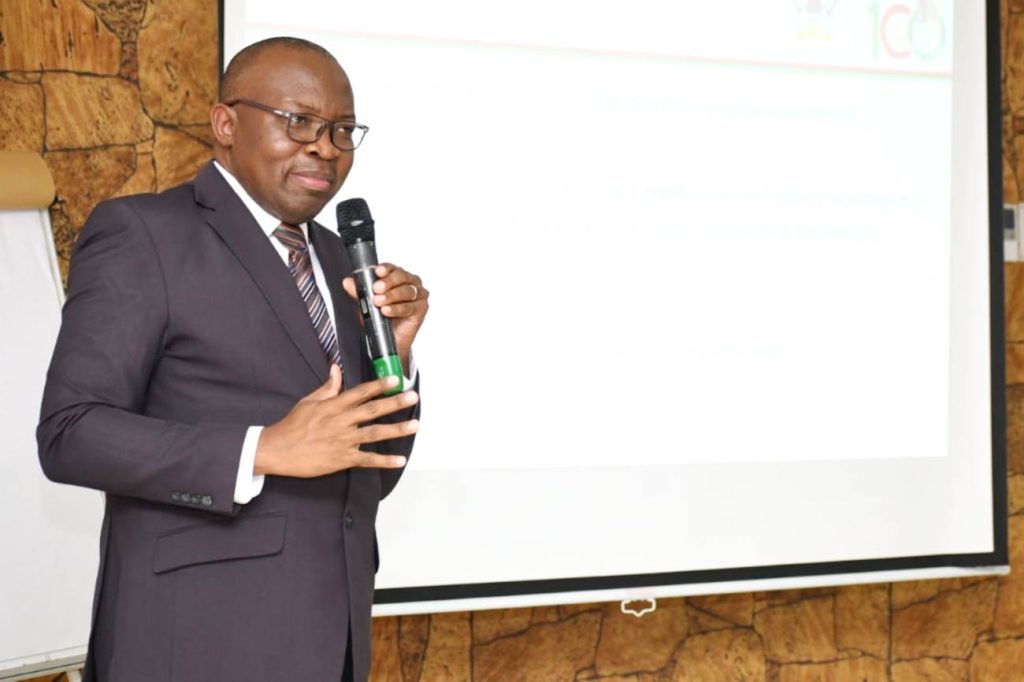
The former Dean shared that the School by virtue of its small size had to deal with issues of limited capacity to facilitate a flagship taught PhD programme and limited resources. It overcame the former through multidisciplinary collaborations both within CEES and the College of Humanities and Social Sciences (CHUSS), and the latter through aggressive resource mobilization.
“We won three Mak-RIF projects, small as we were, and combined, we got UGX 500million. We also participate in a research network where we coordinate with CODESRIA (the Council for the Development of Social Science Research in Africa) and we have previously had a multi-institutional network where we sent six PhD students to Finland for six months, others were sent to South Africa and three staff for exchange, and we hope we can continue to build on these networks” reported Prof. Bisaso.
Presenting his experience, Prof. John Mango who served as Dean, School of Physical Sciences, College of Natural Sciences (CoNAS) urged his audience to always incorporate the theory of change in all their plans. A theory of change is a purposeful model of how an initiative—such as a policy, a strategy, a program, or a project—contributes through a chain of early and intermediate outcomes to the intended result[1].
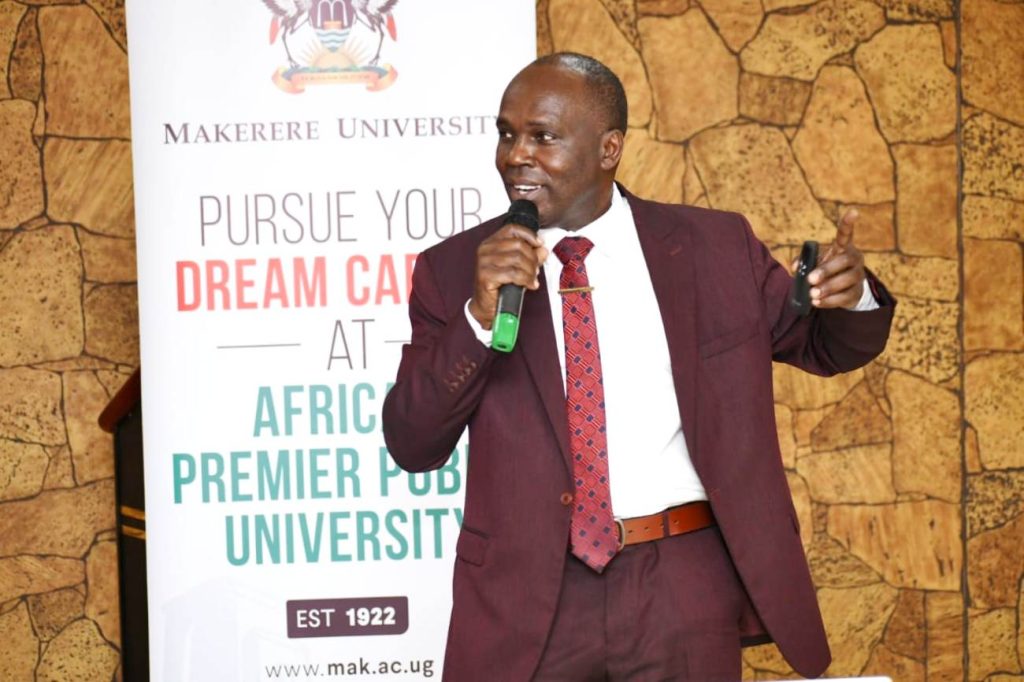
“In whatever you want to do, you should think of objectives in line with guidance from above, you must identify activities to achieve what you want and what you want may be results at different levels such as immediate outputs and long-term impacts” explained Prof. Mango.
His presentation therefore covered; promoting excellence in research, resource mobilization, preparing human resource, improving on research environment and infrastructure, ensuring quality assurance mechanisms at all stages, facilitating training of high quality graduates, deepening collaborations with industry and community, promoting multidisciplinary research projects and creating, promoting alumni networks and the role of Deans in improving graduation rates.
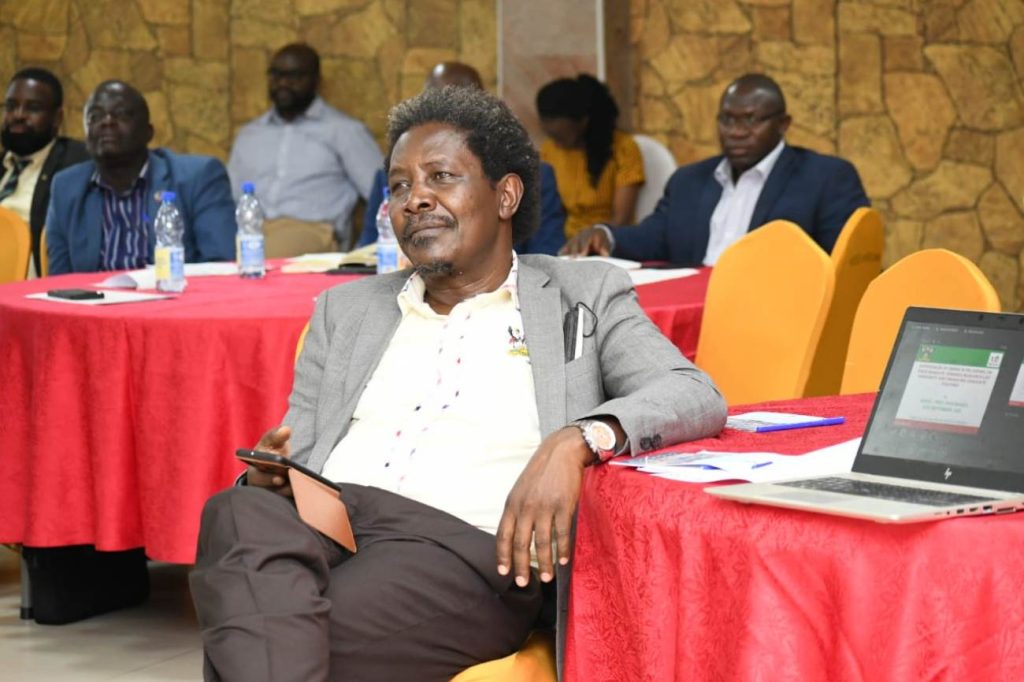
Prof. Mango noted that research collaborations are an integral part of a research-led university for they lessen the burden on the Government’s resource envelope. He added that graduate training was an important component of fostering Makerere’s research-led aspiration and urged Deans to always be on the lookout for what regional bodies such as the Inter-University Council of East Africa doing to support this. He also proffered think tanks that conduct research relevant to national development as another way of attracting funding that can cater for graduate training.
To illustrate his point, Prof. Mango testified that he had “mobilised resources and trained 35 PhDs in Mathematics out of the approximately 60 PhDs that the country has,” adding that “raising funds is not an event, it is a process and when you are just starting, your percentage of winning is very low.”
All the aforementioned activities aimed at ensuring that the university achieves her research-led aspirations are guided by policy. The new Director of the Quality Assurance Directorate (QAD), Dr. Cyprian Misinde in his address informed Deans that his unit was developing matrices for policies.
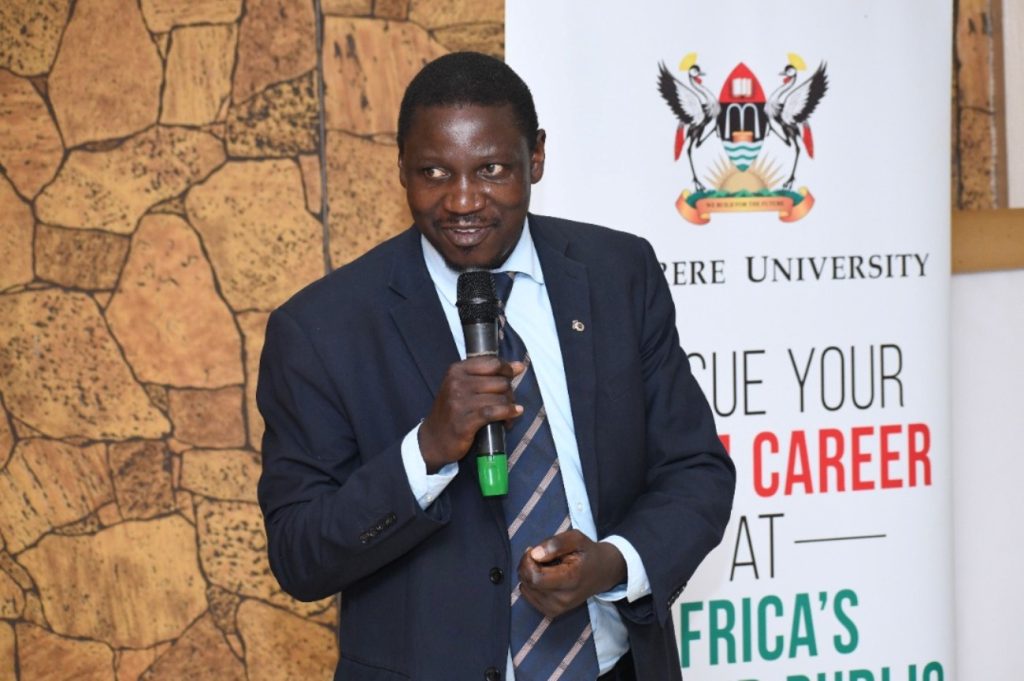
“We shall be evaluating quality assurance based on your performance in these policies. And so it is very important that these policies are being discussed here” said the Director. He added that Deans are valuable partners in the quality assurance process, especially as the Directorate sets about establishing an efficient, effective and robust data system to aid accountability and decision making.
Monitoring and Tracking SDGs at Mak
Turning to the SDGs, Makerere University participated in its first Impact Rankings in the year 2022 and was ranked in the 401-600 band. Currently in their fourth edition, the Times Higher Education Impact Rankings are the only global performance tables that assess 1,406 universities from 106 countries/regions against the United Nations’ SDGs across four broad areas of research, stewardship, outreach and teaching.
According to the presentation by QAD’s Mr. Stephen Mpirirwe, Makerere performed best in SDG 17 (Partnerships for the goals) with a score of 83, followed by SDG 16 (Peace, justice and strong institutions) with a score of 64. Next was SDG 3 (Good health and well-being) with a score of 63.7, followed by SDG 5 (Gender equality) with a score of 39.6. The best performing institution globally, Western Sydney University, Australia scored 99.0, 93.3, 90.0 and 80.3 in SDGs 17, 12 (Responsible consumption and production), 6 (Clean water and sanitation) and 5 respectively. Please click here to view the detailed Impact Rankings for Makerere University.
MUDF’s Purpose and Constitution
Prof. Ronald Naluwairo who presented the MUDF Constitution noted that for purposes of inclusivity, the Forum is composed of Deans of Schools, Directors of Teaching Institutes including off-campus Centres such as the Makerere University Jinja Campus and the Principals and Deputy Principals of three-tier colleges such as the School of Law.
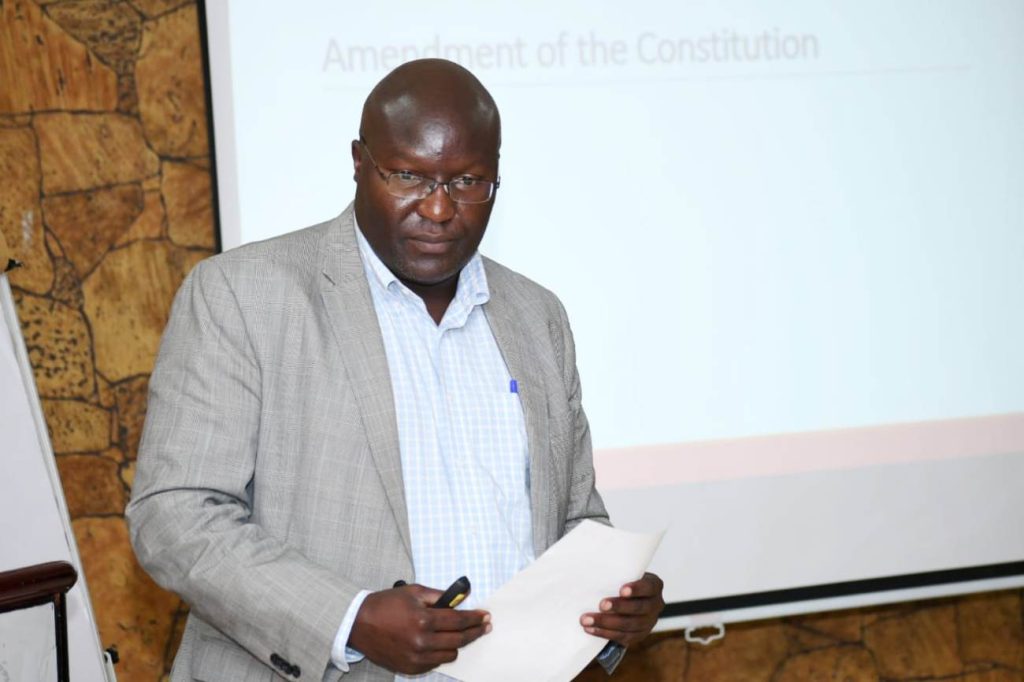
MUDF’s overall objective is to promote academic excellence through collective action, capacity building and harnessing each others’ capabilities, experiences and best practices. The Forum has six specific objectives namely to; Promote the highest standards of teaching and learning at Makerere University, Promote and provide leadership in cutting edge research and innovation at Makerere University and Build and strengthen the capacity of members of the Forum as academic leaders. Furthermore, the Forum proposes to; Promote debate and dialogue about issues concerning academic excellence, Advise Senate, University Management and other organs of the University about matters concerning teaching and learning, research and innovations, and Promote good governance at Makerere University.
Addressing the workshop the Chairperson, MUDF Executive Committee and Dean, School of Public Health, CHS, Prof. Rhoda Wanyenze said that the Forum was aimed at giving the 30 Deans a platform to meet and network beyond the business of Senate. “We are supposed to spearhead change in this large institution and we are supposed to work with one another to break silos and conduct multidisciplinary activities across colleges, but we cannot achieve this unless we know and understand each other.”
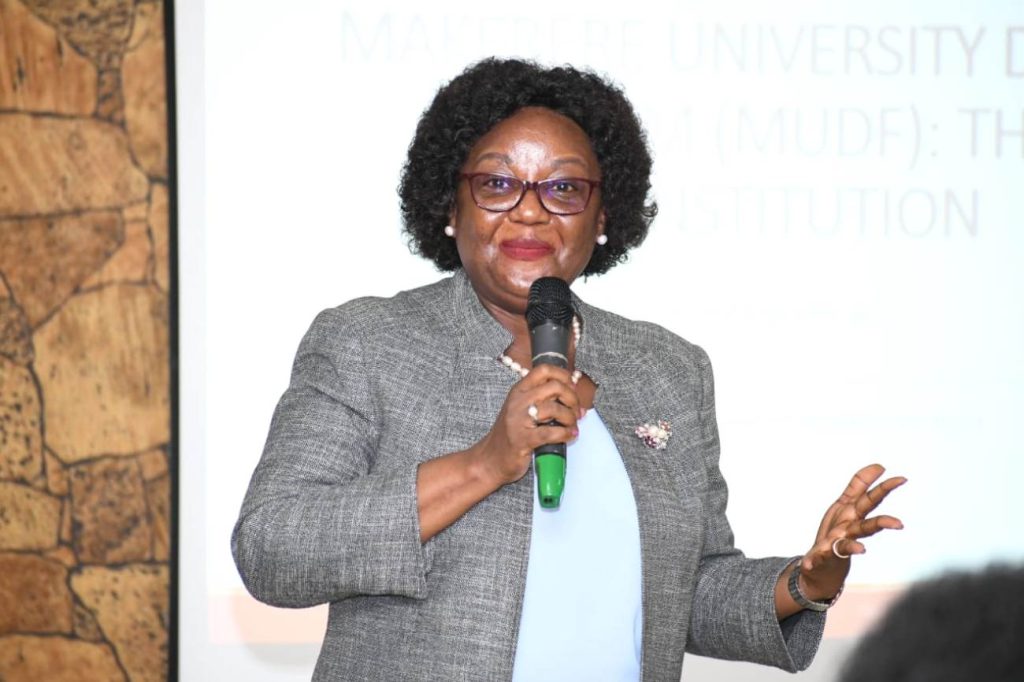
The Chairperson therefore paid tribute to the Patron and brainchild of MUDF, Prof. Umar Kakumba for his brilliant idea of bringing Deans together and thanked staff in the DVCAA’s Office for supporting the Executive Committee.
“This Forum is so important in terms of appreciating where we are headed as a University and what we all need to do to ensure that we get there, because we are best placed to shift Makerere to what we want to see” encouraged Prof. Wanyenze. She welcomed the new Deans to MUDF and urged them contribute ideas on how the Forum can be made more vibrant so as to make meaningful contribution to Makerere.
[1] Serrat, O. (2017). Theories of Change In Knowledge solutions: tools, methods and approaches to organizational performance. Singapore: Springer. DOI:10.1007/978-981-10-0983-9_24
You may like
-


Mak Selected to Host Alliance for African Partnership Africa Office
-


Mak hosts First African Symposium on Natural Capital Accounting and Climate-Sensitive Macroeconomic Modelling
-


Strengthening Global Partnerships to Advance Research, Innovation, and Graduate Training: Makerere University Hosts Delegation from the University of Warwick
-


Makerere Launches Scholarly Guide, Calls for Increased Research, Publication and Innovation in Africa
-


When Birth Becomes the Most Dangerous Moment, Wanduru & the Work of Making Labour Safer
-


For Youth by Youth – Call for Second Cohort Applications

The 76th Graduation Ceremony of Makerere University will be held from Tuesday 24th to Friday 27th February, 2026. A total of 213 PhDs (87 female, 126 male), 2,503 Masters (1,087 female, 1,416 male), 206 Postgraduate Diplomas (80 female, 126 male), 6,343 Undergraduate Degrees (2,999 female, 3,344 male), and 30 Undergraduate Diplomas (9 female, 21 male) will be graduating from all the Colleges.
Ms. Sarah Aloyo and Ms. Nakato Dorothy both students of the Bachelor of Procurement and Supply Chain Management emerged as the best in the Humanities and Best Overall students with a CGPA of 4.93. Mr. Ssewalu Abdul, a Bachelor of Leisure and Hospitality Management student emerged second best in the Humanities with a CGPA 4.90. Ms. Esther Ziribaggwa emerged as the best student in the Sciences with a CGPA of 4.77 in the Bachelor of Agricultural and Rural Innovation, while Mr. Simon Mungudit emerged second best in the Sciences with a CGPA of 4.76 in the Bachelor of Science in Petroleum Geoscience and Production.
Commencement Speakers
- Day 1 – Prof. Nicholas Ozor, the Executive Director of the African Technology Policy Studies Network, Nairobi, Kenya
- Day 2 – Prof. Dr. Maggie Kigozi, Chairperson Makerere University Endowment Fund Board
- Day 3 – Dr. Patricia Adongo Ojangole, Managing Director, Uganda Development Bank Limited
- Day 4 – Ms. Reeta Roy, Former President & Chief Executive Officer, Mastercard Foundation
The 76th Graduation Ceremony will be held at the Freedom Square following the schedule below:
Tuesday, 24th February, 2026
College of Agricultural and Environmental Sciences (CAES)
College of Computing and Information Sciences (CoCIS)
College of Education and External Studies (CEES)
School of Law (SoL)
Livestream Link for Day 1: https://youtube.com/live/wVGPA0FJ9pU
Wednesday, 25th February, 2026
College of Health Sciences (CHS)
College of Natural Sciences (CoNAS)
College of Veterinary Medicine, Animal Resources and Bio-security (CoVAB)
School of Public Health (SPH)
Thursday, 26th February, 2026
Makerere University Business School (MUBS)
College of Business and Management Sciences (CoBAMS)
Friday, 27th February, 2026
College of Engineering, Design, Art and Technology (CEDAT)
College of Humanities and Social Sciences (CHUSS)
Institute of Gender and Development Studies (IGDS)
Makerere Institute of Social Research (MISR)
General
Mak Selected to Host Alliance for African Partnership Africa Office
Published
1 day agoon
February 23, 2026
Makerere University has been selected to host the Africa Office of the Alliance for African Partnership (AAP). The significant milestone that underscores Makerere’s role in fostering research, innovation, and global collaborations across the continent was announced at a meeting of the University’s Central Management with an AAP delegation on 23rd February 2026.
Makerere’s selection was based on the University’s robust commitment, alignment with the AAP’s Strategic Plan, and proven ability to manage consortium activities. The AAP, which was initiated by Michigan State University (MSU) in collaboration with Ten African Universities and agricultural policy research networks in 2016, targets critical challenges in education, youth empowerment, health and nutrition, agri-food systems, science and technology, water, energy, environment, and culture and society.
Addressing the delegation consisting of AAP Co-Directors from MSU, Dr. Jose Jackson-Malete and Dr. Amy Jamison, accompanied by newly-appointed Director of the AAP Africa Office, Dr. Racheal Ddungu Mugabi and Ms. Clare Cheromoi, the Vice Chancellor, Prof. Barnabas Nawangwe who appreciated the choice of Makerere to host the Africa Office said:
“One of the greatest challenges facing African universities is PhD training, particularly supervisory capacity. Through partnerships such as the Alliance for African Partnership we can leverage international expertise to strengthen supervision—whether through training supervisors or through joint supervision arrangements.”
Prof. Nawangwe equally applauded joint initiatives such as the Grant Writing and Publication project, which gave rise to the establishment of a Writing Centre that he said can be used to build capacity in AAP member universities with Makerere as the hub. Officially launched on 21st March 2023, the project is living up to its expectation of becoming a springboard for strong postdoctoral collaborative research for both institutions and other US universities.
Dr. Titus Awokuse, Vice Provost and Dean for International Studies and Programs at Michigan State University (MSU) who attended virtually, reiterated that Makerere’s selection reflects its long-standing commitment to advancing African higher education, research excellence, and meaningful global collaboration.
Reflecting on the origins of the Alliance for African Partnerships (AAP), Dr. Awokuse explained that nearly a decade ago, MSU initiated a transformative conversation in Atlanta centered on the question: How should we partner differently? From this dialogue emerged AAP—an Africa-centered consortium that now brings together 12 institutions across Africa and the United States.

He emphasized that AAP is grounded in equity, mutual benefit, shared leadership, and deep respect for African priorities and expertise. Since its founding, MSU has served as convener and key supporter, working with member institutions to strengthen research collaboration, promote faculty and student engagement, and address shared development priorities.
Dr. Awokuse underscored that AAP’s success is the result of collective vision and commitment, not the efforts of a single institution. He paid tribute to Lilongwe University of Agriculture and Natural Resources for hosting the Africa Office in its early years and acknowledged the foundational leadership of the inaugural Africa Office Director.
He described the launch of the Africa Office at Makerere University as a significant milestone that reinforces Africa-led leadership, strengthens regional collaboration, and enhances responsiveness to emerging opportunities. MSU, he affirmed, remains fully committed to AAP and to working closely with Makerere and all consortium partners to expand collaborative research, nurture the next generation of scholars, and advance Africa-led solutions to global challenges.
The newly-appointed AAP Africa Office Director, Dr. Racheal Ddungu Mugabi is a member of faculty in the Department of Development Studies, Institute of Gender and Development Studies. Her work on intersectional inequalities in Uganda and other Global South regions uniquely positions her to drive collaborative research and partnerships at the Africa Office.
Initially founded by ten African Universities and MSU, AAP now comprises eleven African members including; the African Network of Agricultural Policy Institutes (ANAPRI)-Zambia, Egerton University-Kenya, Lilongwe University of Agriculture and Natural Resources (LUANAR)-Malawi, Makerere University-Uganda, United States International University-Africa-Kenya, Universite Cheikh Anta Diop-Senegal, Universite Yambo Ouologuem de Bamako-Mali, University of Botswana-Botswana, University of Dar es Salaam-Tanzania, University of Nigeria, Nsukka-Nigeria, and the latest, University of Pretoria-South Africa.
These Universites collaborate under Focal Points to advance policy-relevant research and sustainable development. Makerere University’s Focal Point is Prof. Robert Wamala, Director of Research, Innovations and Partnerships (DRIP).
Addressing the University Management, Dr. Jackson-Malete outlined the African Futures Research Leadership Program, which nurtures early career scholars through mentorship and skill-building as one of AAP’s flagship programs. She noted that the Program that prioritizes female participants or men committed to promoting women in higher education has for the first time during its fifth cohort admitted the first male, Dr. Alfadaniels Mabingo from the Department of Performing Arts and Film, Makerere University.
The AAP Africa Office at Makerere will coordinate activities, boost research collaboration, mobilize resources, and enhance global engagements for socio-economic transformation. This aligns with Makerere‘s broader goals of leveraging international expertise to build resilient institutions.
View more photos from the event: https://flic.kr/s/aHBqjCLjoA
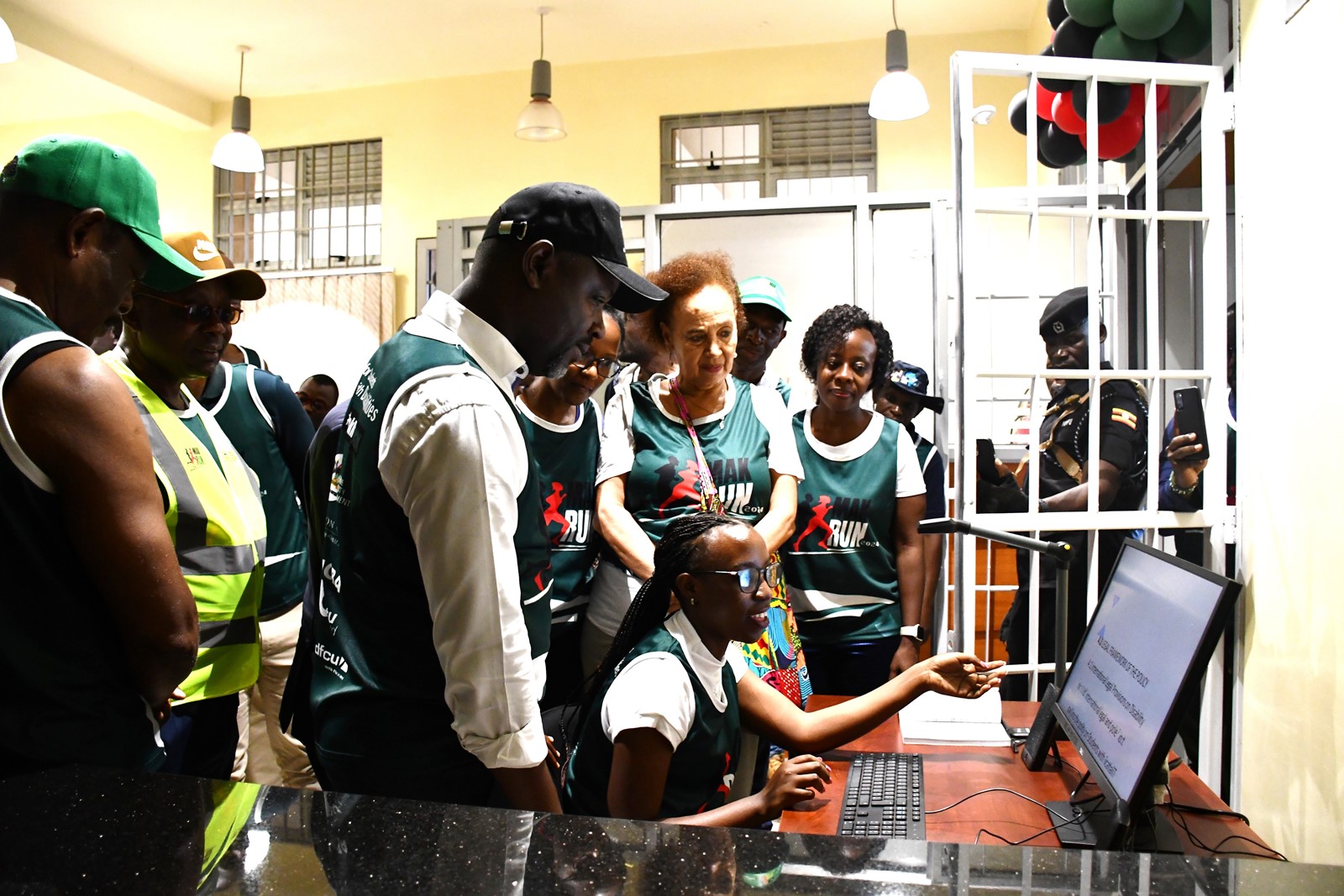
Students with disabilities at Makerere University have been requested to stop seeking for special attention and instead look for solutions and opportunities for personal growth.
This was during a mental wellness, inclusion and safeguarding session organized by the Dean of Students office and the Mastercard Foundation Scholars Program at Makerere University.
Addressing students on mental health and disability inclusion, Mr. Marvin Ggaliwango, a lecturer at the College of Computing and Information Sciences (CoCIS), noted that if the students stop complaining, they will become empowered to take charge of their own development, build resilience and engage confidently in both academic and social environments.
“Turn your lived experiences into tools for innovation. Stop complaining and start creating solutions for yourselves. You are the one living this life, and that gives you the authority to be an expert. When you develop a solution, it doesn’t just benefit you, it helps others too, by removing barriers,” Mr. Marvin Ggaliwango, said.
He encouraged students to see themselves not as victims of circumstance, but as active participants and co-creators of the inclusive environment they wish to experience.
“Learn how to communicate effectively and humbly. If you have a problem, express yourself clearly. Do not isolate yourself or feel resentful. You are not defined by disability, you may face disadvantages, but you still have ability,” he encouraged.
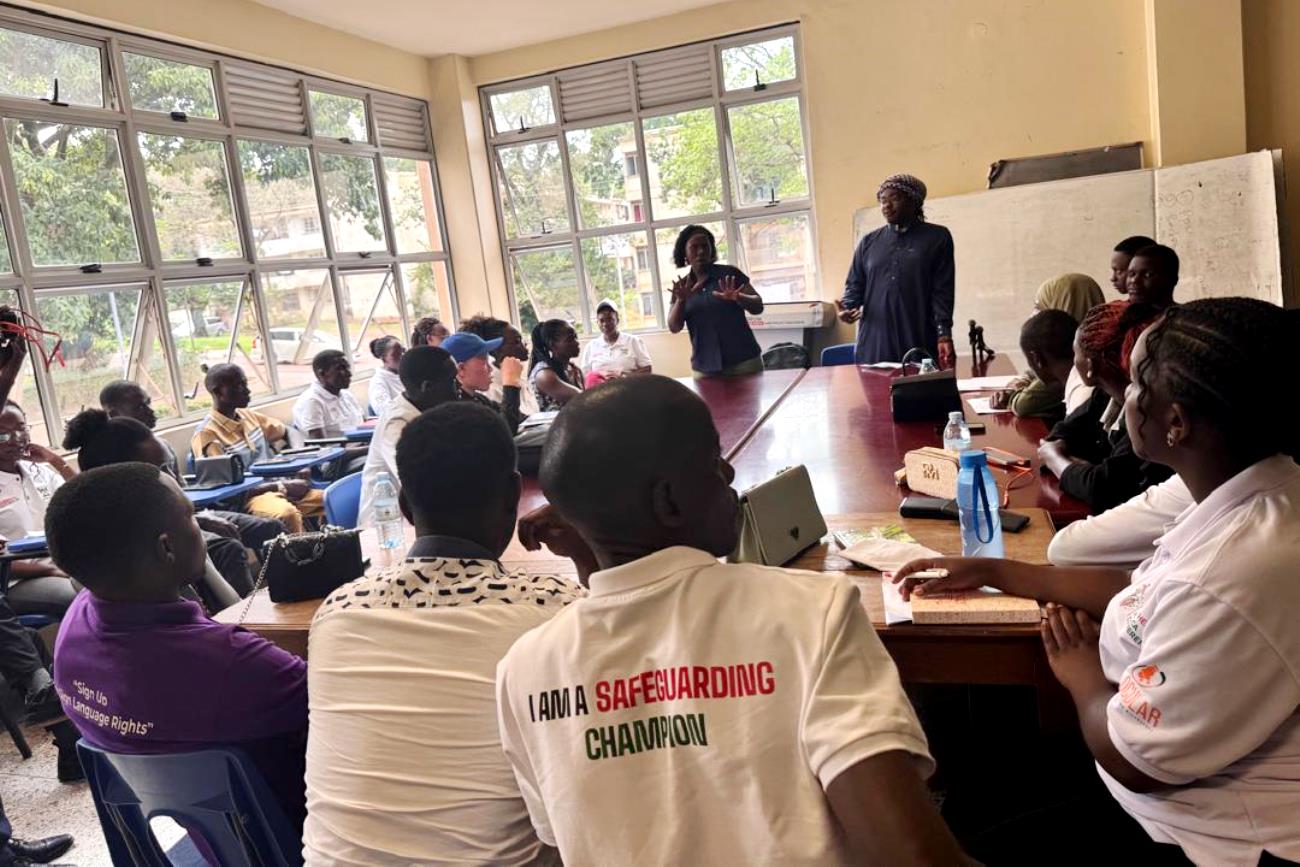
Throughout the session, students listened attentively as he emphasized the importance of self-awareness and personal responsibility, urging them to understand their strengths, acknowledge their limitations and take deliberate steps toward personal growth while contributing positively to the University community.
“We must enhance and ensure that our mental health is number one. Always choose yourself first. Choose what makes you happy and protect your peace. If you are at peace with yourself, your academics will improve. There is a strong link between mental wellness and academic success,” Mr. Ggaliwango, noted.
In his speech, Mr. Musa Mwambu, the Disability Inclusion Advisor at Light for the World Uganda, called upon the students with disabilities to enhance and ensure that their mental health is prioritized.
“As students living with disabilities, sometimes you over expect, because you have a disability you should be given, listened to and when people do not listen to you, you attribute it to your disability, get it from me, even those without disabilities are not listened too. Things are not happening to you because of your disability it is because of the world we live in. Everything that happens to you can happen to others,” Mr Mwambu, noted.
“Have fun with your life. Make yourself happy and be smart. Present yourself in public confidently wherever you go. The way you carry yourself can improve your mental health and how others perceive you,” Mr. Mwambu said.
He reminded the students that gaining admission to Makerere is itself a milestone.
“There are many people without disabilities who have never stepped at Makerere University. Find something that empowers you and hold on to it. You may have a physical impairment, but if you are brilliant in class, you can lead discussions and inspire others,” he added.

During the session, Dr. Rodney Rugyema, the Acting Principal Warden, welcomed the students back from the long holiday. He assured them that the University is committed to their safety and well-being while on campus.
Dr. Rugyema emphasized that the University has systems in place to protect students, both physically and psychologically and encouraged them to report any concerns promptly.
“When you are at the University, you are not on your own, we are always here for you. For us to engage you on mental wellness and inclusion, we want you to be in the right state of mind, whole and complete,” Dr Rugyema, said.
He added: “We are here to empower you and we are calling upon you not be a risk for yourself and always be able to detect risks that are likely to affect your mental health and works towards avoiding them and reporting them to ensure that the University manages them before they escalate into real harm whose impact is more serious than you can think,”
During the session, Ms. Diane Nabikolo Osiru highlighted the University’s broader commitment to safeguarding.
Safeguarding at Makerere University refers to measures put in place to promote safety and wellness of all students, staffs and other stakeholders.
“At Makerere University, safety is not a luxury for few. but it is a right for every student. As the semesters begins, we are urging you to learn how to identify signs of harm or abuses and report them to the appropriate safeguarding contact points,” Ms Nabikolo, said.
For support in case of any harm or abuse, International and Refugee Students, can access support through the Advancement and International Office, while Students with Disabilities, can utilize the Disability Support Center. Those with personal and emotional challenges, can visit the Counselling and Guidance Centre.
In his speech, Dr Joab Agaba, a Lecturer in the College of Computing and Information Sciences, guided students how to report risks and incidences to the MakSafeSpace, the e-reporting platform complimenting the other University traditional reporting channels.
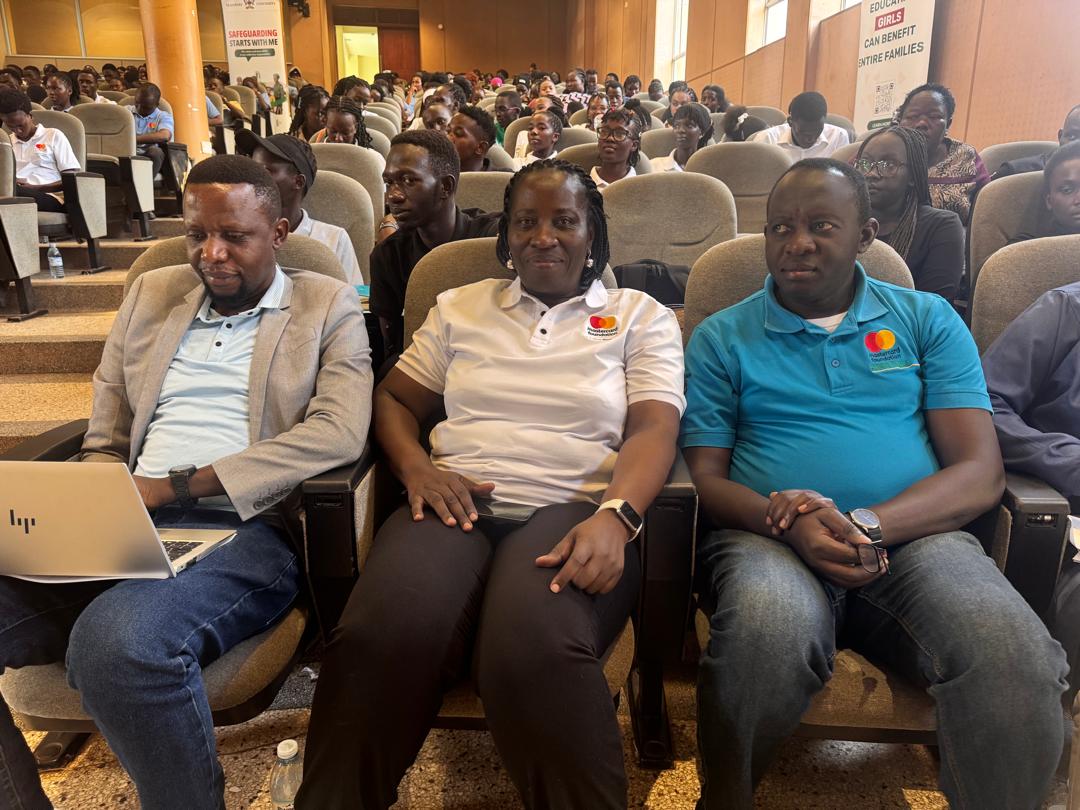
Mr. Henry Nsubuga, the Manager of the Counselling and Guidance Center, shared practical strategies for coping with stress effectively including time management, setting realistic goals, seeking support from peers or counsellors.
Students speak out
Shanitah Nahamya, 2nd year student of the Bachelor of Adult and Community Education
“I have learned how to respectfully and appropriately engage with students with disabilities. In the past, I often felt pity when I encountered them, but now I understand that what they need is not pity, it is respect, support, and equal opportunity.”
Guo Dorothy Geri, 1st year student of the Bachelor of Commerce
“I have learnt how to use inclusive language. Before offering help to a student with a disability, I will first ask them, because not all the time do they need our help. You might think someone wants to be helped to cross the road, yet they are waiting for someone.”
Valentines Doris Aduka, 1st Year student of the Bachelor of Biomedical Science
“I have been calling students with disabilities special names, thinking it was kind. But I have learned that they do not want to be treated differently or labeled in a special way. What they value most is being treated like everyone else, with respect, dignity, and fairness.”
Trending
-

 Humanities & Social Sciences2 days ago
Humanities & Social Sciences2 days agoMeet Najjuka Whitney, The Girl Who Missed Law and Found Her Voice
-

 Health6 days ago
Health6 days agoUganda has until 2030 to end Open Defecation as Ntaro’s PhD Examines Kabale’s Progress
-

 Agriculture & Environment4 days ago
Agriculture & Environment4 days agoUganda Martyrs Namugongo Students Turn Organic Waste into Soap in an Innovative School Project on Sustainable Waste Management
-

 General6 days ago
General6 days agoMastercard Foundation Scholars embrace and honour their rich cultural diversity
-

 Health2 weeks ago
Health2 weeks agoCall for Applications: Short Course in Molecular Diagnostics March 2026
